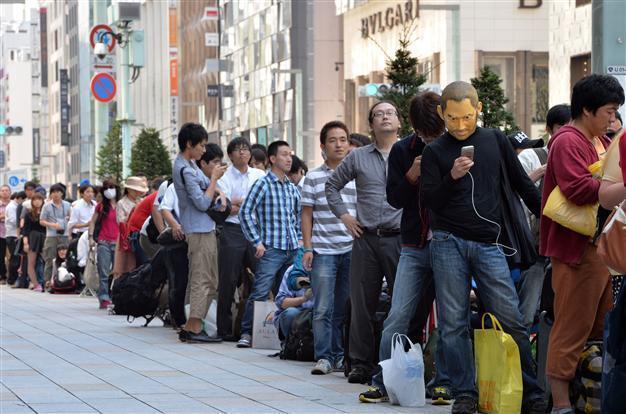Apple buyers rue high price of new 'low cost' iPhone
TOKYO - Agence France-Presse

Customers queue to buy Apple's new iPhone 5c and 5s smartphones outside the Apple Store in Tokyo on September 20, 2013. AFP Photo
Apple fans clamouring for the two new iPhones formed a kilometre-long queue in Tokyo Friday, but high prices in Asia and the lack of a new tie-up in the vast China market dampened the global roll out.The once-unbeatable smartphone has secured a lucrative new deal with Japan's biggest mobile carrier that lent some celebrity glitz to the opening day in Tokyo, and guaranteed a lively welcome from a nation of gadget-lovers.
Diehard fans began lining up last week and even sat out a weekend storm that lashed the Japanese capital to keep their spot in a queue that grew to around a kilometre (half-a-mile) in length by opening time, police estimated.
Media helicopters hovered over Tokyo, where a man dressed as Batman waited outside the Apple store in upmarket Ginza next to a woman with a shock of pink hair and a lifesize Steve Jobs pillow.
Actor Ken Watanabe, star of "Inception" and "Letters From Iwo Jima", was on hand to welcome buyers with a handshake and a broad smile at Docomo's main Tokyo shop, marking the new alliance between Apple and the country's biggest carrier.
The firm, the mobile unit of NTT, which has about 42 percent of the Japanese market, has shed more than 3.5 million subscribers to rivals since 2008, when SoftBank first rolled out the iPhone in Japan, local media have reported.
Hisako Nagashima, a 34-year-old manicurist who was waiting to snap up an iPhone 5S in gold, said it had been make-or-break time for her relationship with the company.
"If NTT Docomo had not released iPhone this time, I would have changed carriers," she told AFP.
There was no crush in China, where Apple had a pre-booking system to avoid a repeat of the near-riot in Beijing that hospitalised four people at the 2011 release of the iPad 2.
Those prepared to shell out a minimum 4,488 yuan ($730) for the pared down iPhone 5C, or at least 5,288 yuan ($864) for the iPhone 5S said they didn't mind the cost.
"It's not about the price, its about the brand, I think Apple is the best," said Chang Yi, a 29 year old real-estate salesman.
Others milling around outside the store had a different opinion.
"It's too expensive... it's a luxury item," said 19-year-old student Meng Jia. "If the price was around 2,000 yuan, I would buy one".
Singapore's biggest carrier, Singtel said it expected 10,000 people to pick up their new iPhones at its launch event, and that there had been a rush on the gold model.
"Our gold-colour iPhones were completely sold out within four minutes when we opened online reservations on 18 September," said a Singtel spokesman.
While Japanese customers were offered either phone -- the souped-up iPhone 5S or the stripped-down iPhone 5C -- "free" with two-year contracts, in places where up-front payments are common, the sticker price stung.
"Wow, $1,129 (US$1,065) for an iPhone 5S here in Australia. That's simply insane," tweeted Bill Hutchison, referring to the cost of a 64GB model of the new version, which boasts a speedier processor and a fingerprint sensor.
Another, David Smith, tweeted: "Incredible -- Apple charging $99 for iPhone 5C in the USA (with a contract) but $740 in Australia and its $1,200 for 5S - no wonder Android phones are popular." The polycarbonate-bodied 5C, supposedly aimed at budget-conscious smartphone shoppers, was widely flagged as Apple's answer to the onslaught of cheaper, Android-powered models, led by Samsung.
Apple has not revealed what the "C" stands for, but did not knock down months of media speculation that it was intended to signify "cheap" or "China".
In an interview with Bloomberg Businessweek published Thursday, Apple chief executive Tim Cook said quality had always been the driving force.
"We never had an objective to sell a low-cost phone," Cook told the magazine. "Our primary objective is to sell a great phone and provide a great experience, and we figured out a way to do it at a lower cost." Wang Ying, a Beijing-based analyst with consultant firm iResearch said Apple appeared to have missed a trick by not reaching a deal with China Mobile -- the country's largest carrier.
Currently, Apple has sales contracts with China Unicom and China Telecom. "Cooperating with China Mobile will be a significant channel for Apple to... win more users." Despite their simultaneous availability in China -- the first time Apple has brought the country online in the initial wave -- Hong Kong's resellers were pouncing, hoping to flip the phones for as much as double what they paid.
"Handsome boy, are you selling your phones?" a reseller was heard discreetly saying, before leading new iPhone 5S owners to the back stairs of the shopping mall to carry out the transaction.
The much-coveted gold-coloured iPhone, which resellers thought would attract a real premium in status-conscious Hong Kong, was nowhere to be found.
"I haven't seen a gold one yet," a reseller, who declined to give his name, told AFP an hour into the launch.
















